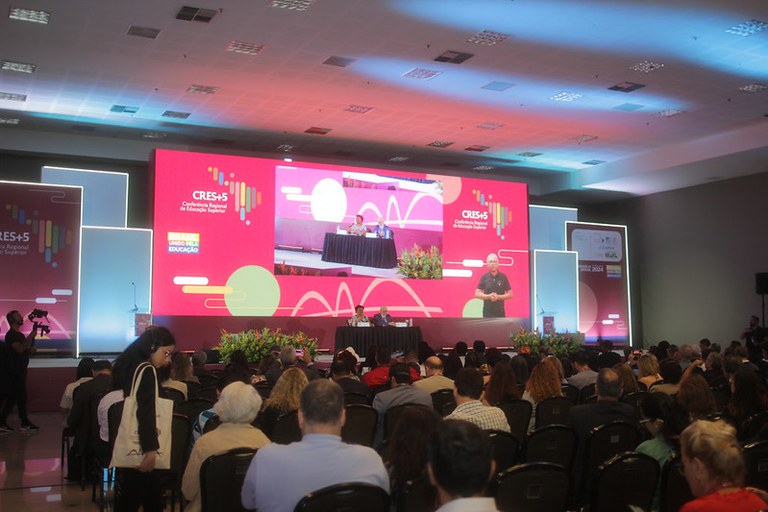Notícias
CRES+5
CRES+5 debates the challenges of a new higher education model

The second day of the follow-up meeting to the III Regional Conference on Higher Education (CRES+5), held on Thursday, March 14th, was marked by a debate on regional integration in Latin America and the Caribbean, as well as building a more equal and equitable higher education system. In sectoral meetings, six thematic axes were examined: precariousness of the teaching profession, effects of Covid-19 on higher education, women in education, financing and governance, autonomy of universities and future of education in Latin America and the Caribbean.
The discussions underscored the need for sustained government efforts to facilitate the restoration of education to its pre-pandemic standards, as well as for improving working conditions and remuneration for educators, in order to attract and retain qualified professionals in the classroom. Participants in the debates emphasized the ongoing need to safeguard women's space in education, who are the majority in the field. This includes combating discrimination and threats they may face in the exercise of the profession.
Regarding the autonomy of higher education institutions, they believe that only public funding guaranteed by law can bring about real change in the region's higher education model. For Chile's Higher Education Undersecretary, Victor Orellana, "the message for Latin America is that the solution to our problems lies not in the market, but in ensuring the right to education, without necessarily replicating models of public universities from other historical periods." Today we need, for example, more modern financing, in the sense of better instruments to integrate into the system. We require a more effective connection between productive development and knowledge, as well as a greater relationship between our academic offerings and the social, cultural, and productive needs of the countries," he stated.
Orellana believes the region is moving in this direction, but emphasizes the challenge of breaking away from a model that prioritizes profit as the main driving force behind higher education. "We ask the continent to agree on the right to education and the connection between higher education and development beyond political slogans. To ensure the right to education and to acknowledge that higher education is fundamentally a public good, not a market commodity. It is not the slogan of one sector; it is an international consensus, a consensus that has been achieved with great effort, involving governments from different political backgrounds. We bring this message to strengthen our Latin American vocation, as requested by President Boric [Gabriel Boric, Chile's president], to expand our commitment to Latin America, and to participate in this process that we hope will lead our countries to development."
Professor Nilma Lino Gomes, former Minister of Women, Racial Equality, and Human Rights, emphasized in her speech the possibility of envisioning a distinctive higher education model that respects and incorporates the knowledge and wisdom of significant segments of society – including indigenous, Afro-Latin American and Caribbean leaders – particularly within a context of full democratic rule of law. However, Gomes noted that this is not an easy undertaking, especially amidst escalating social conflicts and diverging political-ideological views. "Society is polarized, as we have been hearing from various analysts. I see this polarization as having reached a certain peak, as it now has a political representation in Brazil that it did not have before, in the same way that we see today. Ultimately, if we consider that we are a society with a colonial, slaveholding past, with an attempt at indigenous genocide, what we call polarization today are views that have always existed. However, these views are now expressed alongside market fundamentalism, religious fundamentalism, a large hegemonic media, and political representation,” she concluded.
New forum – On Thursday 14th, during CRES+5, the UNESCO International Institute for Higher Education in Latin America and the Caribbean (UNESCO-IESALC) held the inaugural meeting of the Higher Education Policy Makers and Managers Network (RedPES) of Latin America and the Caribbean. This new organization brings together high-level representatives from the region's higher education systems to discuss policy development in the sector, share experiences, ideas, and best practices, establish connections, and foster collaboration with international peers.
The meeting laid the foundations for the launch of RedPES, discussing members' priorities, areas of interest, and preferred forms of participation. Additionally, they introduced the higher education policy hub, UNESCO-IESALC's dynamic portal offering tools and resources for policymakers and stakeholders in higher education. The hub covers over 150 countries and provides access to analytical publications, podcasts, and meetings related to policy matters.
In the view of Dameon Black, chair of the UNESCO-IESALC Governing Board, "this is an excellent initiative. It will provide a forum through which valuable information and learning can be shared for the benefit of higher education systems in Latin America and the Caribbean. UNESCO-IESALC deserves commendation".
Closing – This Friday, March 15th, CRES+5 reaches its final day with the Higher Education Policy Forum. Participants will convene in plenary to draft the final document of the meeting, which includes analyses of the progress made since 2018 and proposals for building a new model of higher education for the Latin American and Caribbean region.
MEC Communications Department